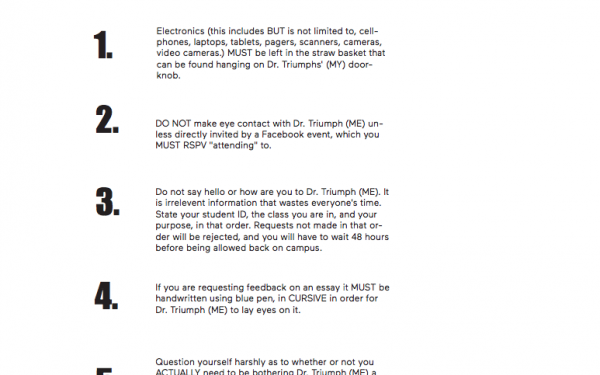Eating disorders: Taking a look beyond the body and self
When medical professionals neglect to look past just the physical, they actively ignore their patients’ needs altogether
TW: This article discusses eating disorders.
When eating disorders are mentioned, it is not unusual for people to think of them as illnesses that only affect the body, ignoring mental health triggers.
Even though eating disorders are a very unique personal experience, a study published in the United States National Library of Medicine has shown that they tend to leave behind long-term psychological effects that are often overlooked.
Drew, whose name has been changed to protect their anonymity, was diagnosed with anorexia nervosa five years ago. Nineteen-year-old Bladimir Rodriguez has been battling bulimia for six years, and Daniela Martinez has also struggled with her relationship with food and her body since her early teen years.
Medical providers warned Rodriguez, Martinez, and Drew about the damage their illnesses could do to their bodies, which included chronic headaches, irregular or absent menstrual cycles, kidney failure, osteopenia or osteoporosis, low blood pressure, reduced metabolic rate, and constipation.
While they were all warned about possible physical repercussions, none of them were warned about the damage that could affect their psyches, such as empathy deficit, attachment insecurity, poor emotional regulation, among other side effects. Some of these psychological repercussions may have long-term impacts on the lives of those recovering from eating disorders, especially if the illness is not treated as more than just a physical one.
Because of the complexity of eating disorders, it remains crucial for patients to receive a multidisciplinary treatment where they are able to gather enough information to prevent them from getting to a critical state.
“My body was no longer something of mine, but something that had to be fixed. My mind became my enemy for a long time.” — Daniela Martinez
Peggy Claude-Pierre is an eating disorder specialist and author of the book The Secret Language of Eating Disorders. Claude-Pierre developed the concept of the negative mind or confirmed negative condition—terms she uses to describe a disintegrated ego that results in a complete lack of self. It is often manifested as a relentless and destructive inner dialogue.
Claude-Pierre describes agoraphobia, obsessive-compulsive disorder, and panic attacks as the most common comorbidities—a term referring to the presence of more than one disorder in the same individual. Patients tend to develop these symptoms once it seems that behaviours related to the eating disorder have subsided, as she explains in her book.
Those who suffer from eating disorders will often also struggle with additional psychological disorders. Rodriguez was given the diagnosis of anxiety in addition to bulimia nervosa. Drew was diagnosed with social anxiety, generalized anxiety, and chronic depression.
“I just wanted to be seen, to feel important,” Drew said. “I was in a constant state of numbness, I felt lost and empty.”
“My body was no longer something of mine, but something that had to be fixed. My mind became my enemy for a long time,” she added.
It is no coincidence that certain personality traits are common among sufferers such as high harm avoidance (a personality trait characterized by excessive worrying, pessimism, and shyness), low self-directedness, and perfectionism. These traits may play a key role in fueling an eating disorder and remain persistent even after recovery from the condition.
“I am hands down a more perfectionist guy, sometimes in a bad way,” said Rodriguez. “I also suffer from anxiety, so this increased my discomfort. I quit attending some social events since I feel as if everyone is watching me, and it is uncomfortable.”
While those with eating disorders suffer great difficulty in their everyday lives, they are not the only ones affected by their illness.
“Even when I saw all the sorrow I caused my mother, how I was slowly shutting my body down, my mind only wanted me to keep going. My body and food became my only identity," said Drew.
Recovery from an eating disorder can be an arduous process that requires commitment from all parties since, after all, they are seeking to connect with the self again. It is a daily choice, but those who are fighting will never walk alone for there is someone who has traveled down that same path at least once before.
“It's really easy to fall into [eating disorders], and it would really help to teach a healthy relationship with food [during] childhood to everybody. Please stop body shaming. It’s not okay and you never know what is going on in others’ lives,” Martinez added.
“It is not normal, but you’re not a freak. I feel for you, you are not alone,” said Rodriguez.
This article originally appeared in The Body Issue, published February 1, 2022.







